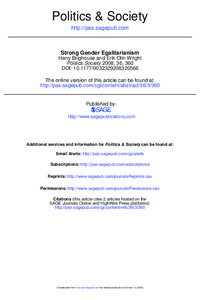Strong gender egalitarianism

Brighouse, Harry ; Wright, Erik Olin
2008
36
3
360-372
child care ; family leave ; parental leave ; work-life balance ; gender equality
Human rights
English
Bibliogr.
"Perhaps the most intractable aspect of gender inequality concerns inequalities within the family around the domestic division of labor, especially over child care and other forms of caregiving. These enduring gender inequalities constitute a significant obstacle to achieving "strong gender egalitarianism"—a structure of social relations in which the division of labor around housework and caregiving within the family and occupational distributions within the public sphere are unaffected by gender. This article explores three kinds of publicly supported parental caregiving leaves that bear on the potential for public policy to transform this private realm of inequality: (1) equality-impeding policies (e.g., unpaid caregiving leaves), (2) equality-enabling policies (e.g., paid caregiving leaves given to families), and (3) equality-promoting policies (e.g., paid caregiving leaves given to individuals rather than families). The authors defend the third of these as necessary, given the importance of cultural constraints on the slow erosion of the gender division of labor over caregiving activities."
Digital
The ETUI is co-funded by the European Union. Views and opinions expressed are however those of the author(s) only and do not necessarily reflect those of the European Union or the ETUI.